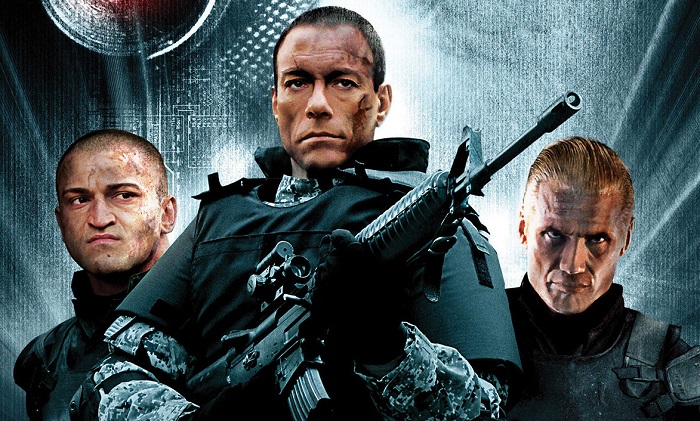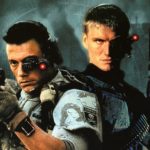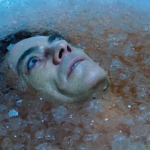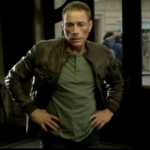
When your last film had you pouring out your heart and soul directly to the audience with a monologue that effectively recontextualizes your entire persona both on-screen and off, where do you go from there?
While JCVD didn't quite attract the prestige awards attention that some predicted it might for its titular star, the film none the less was undeniably the precise shot in the arm Jean-Claude Van Damme's career needed. Suddenly he was once again a force to be reckoned with on-screen — a force to be considered in ways he never before had.
So why then, in the wake of such a critically successful film that showed such strong dramatic chops, would he go out and make a second sequel to Universal Soldier? Turns out Universal Soldier: Regeneration attempts to give equal footing to Van Damme's dramatic side with his action side. The key word here, though, being "attempts."
Directed by John Hyams (yes, the son of Peter, who directed JCVD in Timecop and Sudden Death and who serves as cinematographer here), the direct-to-DVD Regeneration mostly ignores its immediate theatrical predecessor, a film that in turn ignored a lot of what happened in the film before it as well. If you'll recall — and who could blame you if you don't — in Universal Soldier: The Return, Luc (Van Damme) had somehow inexplicably been relieved of the UniSol technology that allowed him to remain alive while also giving him a previously unseen/unmentioned daughter. However, Regeneration makes no mention of such events and instead leads us to believe that Luc has spent an indeterminate number of years since the first film in cold storage, though now he's working to gain independent control over his functionality and memories beyond the UniSol program. He's done this in Sweden with the aid and assistance of Dr. Sandra Fleming (Emily Joyce). Her goal is ultimately to have Luc rejoin society, though her motivation for doing so is neither mentioned nor intended to be a mystery.
Despite a desire for rehabilitation, Luc seems destined to remain the violent man he was resurrected to be. PTSD mixed with paranoia causes him to violently lash out at a perceived threat during breakfast one morning. Then it's not long until a joint strike force between the United States and Ukranian militaries forcefully compel Luc to return to the UniSol program. A separatist cell has kidnapped the children of the Ukranian prime minister and threatened to blow up one of the remaining Chernobyl nuclear reactors unless their demands are met. The separatists have a UniSol of their own, one who has already taken out an entire squad of UniSols sent in by the United States. They believe Luc is their last chance at saving the day.
There's a solid story here with strong themes of nature versus nurture, the inherent violent nature of man and the futility and endless nature of war. Likewise, there's a great chance for Van Damme to further stretch his dramatic muscles as he struggles to reconcile the duality of his desire for normality and peace with the violence that bursts forth as if by reflex. So it's a shame that that movie gets utterly buried by everything that doesn't involve Luc, who, despite the rather robust summary of his story you've just read, the film mostly treats him as a supporting character. Though it's a bit unfair to describe him as such since there's no other story he's there to support, no other soldier or scientist or anyone at the focal point of what's going on. It's a solid 15 minutes before Luc even enters the picture, then another 45 before he's given anything meaningful to do. It's a shame because Van Damme feels ready to dig into this deeply anxious and conflicted version of Luc, but is given almost no time or material to do so. It would have been a perfectly fitting angle for him, too: A man trying to reconcile his violent past with a future that could perhaps involve him leaving said violence behind, but instead gets drawn right back into the combat that made him in the first place.
Instead, the majority of the run time is occupied by military ops gone wrong and decent if mostly unremarkable action sequences involving the joint strike force being taken out by the separatist forces. We get a couple decent one-on-one fights as Hyams chose to recruit MMA fighters for the next-gen UniSols, but for the most part it all feels like pretty standard point-and-shoot action.
The one true bright spot, however, is the return of Dolph Lundgren as Andrew Scott, Luc's commanding officer and fellow rogue UniSol from the original film who was last seen being impaled on and fed into a wood chipper. He's somehow been reassembled and looking none the worse for wear (save for having aged several decades). Lundgren sort of stole the show in the original film though sadly he doesn't have nearly enough screentime or material to do fully the same in Regeneration. That said, he still provides some fun moments and what material he does have to work with only further emphasizes how much unexplored thematic material was ignored in favor of generic action. Sure, action is what most are here for, but still.
Andrew and Luc do get a rematch, thankfully, and it's by far the most entertaining action beat in the entire film. It's a straight up brawl, the likes of which we haven't really seen in a Van Damme film before. There's some martial arts moves here and there, but for the most part this is about two nigh unstoppable, unfeeling killing machines doing everything they can to put their opponent down as fast as possible. Emphasis should be put on "fast," too. Van Damme isn't really known for his speed in combat, but the way Hyams shoots him in action here makes his work in Ringo Lam's films feel a little sluggish by comparison. If nothing else, the fight ends with what has to be one of the best kills ever in a JCVD flick. I won't spoil it, but if creative carnage is your thing you'll likely cheer.
It's a shame that Hyams and screenwriter Victor Ostrovsky weren't more thematically ambitious with Regeneration. There's more than enough explosions and bullets and blood to go around, but none of it remarkable enough to make you forget about the far more interesting concepts bubbling just below the surface. Still, Regeneration manages to be a sight better than much of Van Damme's pre-JCVD direct-to-DVD material. It stands solidly in between being not as good as The Order, but is undoubtedly superior to the likes of The Hard Corps and Second in Command. Let's call it as much of a missed opportunity as Until Death.
Van Dammage Report Statistics for Universal Soldier: Regeneration:
Number of splits: 0
Number of split kicks: 0
Reason for being European: Creole parents from South Louisian
Best line: N/A
You can purchase Van Dammage Report: Vol. 1, a compilation of these essays that also includes content unique to the book, by clicking this link to Amazon.











